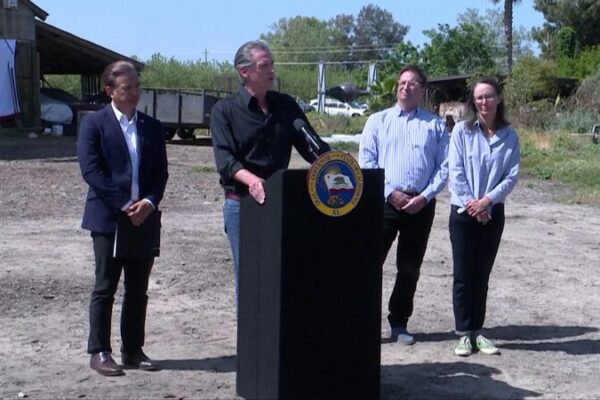California Governor Gavin Newsom announced on Thursday that the state is suing the U.S. federal government over its tariff policies, accusing the administration of unlawfully disrupting California’s economy. This marks the first time a U.S. state has legally challenged federal tariff measures.
But why is California, known as the Golden State, leading this unprecedented charge? As the nation’s largest importer of goods, California has been hit hard by the tariffs, which have caused disruptions across multiple industries. Official data shows that in 2023, the state’s GDP reached $3.9 trillion, with total imports and exports in 2024 nearing $675 billion. Major trading partners include China, Mexico, and Canada, with exports to China accounting for a significant portion of the state’s trade.
Governor Newsom emphasized California’s commitment to pursuing new strategic trade relationships with international partners. He called on long-standing trade allies to exempt California-made products from any retaliatory measures, stating that federal tariff policies “do not represent the will of the American people.”
“California leads the nation as the first state for agriculture and manufacturing, and it’s our workers, families, and farmers who stand to lose the most from this tax hike and trade war,” Newsom said.
Tariffs Hit Californian Industries HardThe tariffs are particularly damaging to California’s almond industry, the largest in the world, which supplies over 80 percent of global almond demand. With more than three-quarters of their product exported, almond farmers are bracing for significant losses.
A California almond farmer told China Media Group (CMG) that the tariffs will increase the cost of their products, which will eventually be passed on to buyers. “Sometimes they are willing to pay that, sometimes they’re not,” the farmer said.
Agricultural economists are forecasting major setbacks for the industry, with potential orchard closures and widespread farm losses.
The Port of Long Beach, one of the largest container ports in the U.S., has also reported a decline in traffic. Since April, 17 container ships have canceled port calls, and the port anticipates a 20 percent drop in cargo throughput in the second half of 2025 if the tariff policies continue.
Even California’s e-commerce sellers are feeling the pinch. Dusty Kenny, an online retailer based in Northern California, explained that her business, which relies on products imported from China, is facing skyrocketing costs due to the tariffs.
“The cost is just too high, not 10 percent or 20 percent, but the cost per product could double or triple,” Kenny told CMG. “When you try to contact U.S.-based manufacturers, they don’t even return your calls or emails.”
She added that her company has tens of thousands of products in its warehouse, and if tariffs are imposed on all of them, they’ll have to absorb huge costs to avoid raising prices for customers. Relocating production to the U.S., she said, is simply not feasible.
As the lawsuit moves forward, California hopes to alleviate the economic strain on its industries and workers. The outcome could set a significant precedent for other states feeling the impact of federal tariff policies.
Reference(s):
Why is California launching a lawsuit against Trump tariff hikes?
cgtn.com








